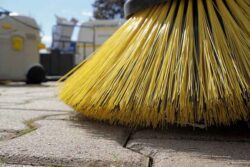
Welcome to the journey of environmentally conscious boat cleaning, where clean waves meet eco-friendly shores. Cleaning your boat in a way that preserves our waterways is more than just tidying up; it is about taking on the role of stewards of the seas, and in this guide, we will go over easy and efficient ways to clean your boat while being mindful of the environment. From eco-friendly waste disposal to gentle cleaning solutions, let us navigate the waters of sustainability and make sure that every ripple from our boat leaves the ocean as pure as we found it.
As boat enthusiasts, we must acknowledge the influence that our cleaning habits can have on the aquatic ecosystems that we value so much. By implementing sustainable cleaning practices, we safeguard the marine life beneath our boats and also improve the general health of our waterways. So let us set out on this journey together, learning how minor decisions about cleaning supplies and methods can have a big impact on keeping our lakes and oceans beautiful for future generations.
See also our post on Sustainable Office Cleaning: Green Practices for a Productive Workspace
The Impact of Boat Cleaning on Waterways
1. Harmful Chemicals and Marine Life
Traditional boat cleaning products often contain harsh chemicals that can be detrimental to marine life. Understanding the impact of these chemicals on fish, corals, and other aquatic organisms emphasizes the need for sustainable alternatives.
2. Runoff and Water Quality
Improper cleaning techniques can lead to runoff, introducing pollutants into the water. This runoff, laden with detergents and contaminants, can compromise the water quality and harm the delicate balance of marine ecosystems.
3. Plastic Waste and Ocean Pollution
Many cleaning tools and products are made of plastic, contributing to the ocean’s plastic pollution. Recognizing the link between plastic waste and ocean health highlights the importance of choosing sustainable and biodegradable alternatives.
4. Disturbance to Aquatic Habitats
Excessive boat cleaning, especially in sensitive areas like coral reefs and seagrass beds, can disturb aquatic habitats. Understanding the potential impact of our cleaning practices helps us adopt a more considerate approach to preserving these environments.
5. Legal Regulations and Environmental Responsibility
Awareness of legal regulations regarding boat cleaning practices underscores the shared responsibility of boat owners to adhere to environmentally friendly methods. Complying with these regulations ensures a collective effort to protect our waterways.
See also our post on Sustainable Cleaning for Your Kayak: Paddling in Clean Waters
Eco-Friendly Cleaning Products and Solutions
Biodegradable Boat Soaps
Opt for biodegradable boat soaps that break down naturally without harming marine life. These soaps effectively remove dirt and grime without leaving behind toxic residues, promoting a cleaner vessel and a healthier marine environment.
Non-Toxic Hull Cleaners
Choose hull cleaners that are non-toxic and phosphate-free. These cleaners effectively remove algae and barnacles from the boat’s hull without introducing harmful substances into the water.
Vinegar and Baking Soda Solutions
Create DIY cleaning solutions using common household items like vinegar and baking soda. These natural alternatives are gentle on the environment, safe for marine life, and effective in tackling various cleaning tasks on your boat.
Eco-Friendly Deck Cleaners
Invest in deck cleaners specifically formulated to be environmentally friendly. These cleaners are free from harsh chemicals and provide a safe way to maintain the cleanliness of your boat’s deck without compromising water quality.
Green Stainless Steel Cleaners
For metal surfaces on your boat, use green stainless steel cleaners that are free from harmful chemicals. These cleaners maintain the shine of stainless steel without introducing pollutants into the water.
See also our post on Sustainable Cleaning for Your Canoe: Paddling in Eco-Harmony
Best Practices for Sustainable Boat Cleaning
Clean Only What’s Necessary
Adopt a minimalist approach to boat cleaning by focusing only on areas that truly need attention. This reduces the use of cleaning products and minimizes the impact on the water.
Use Absorbent Materials for Cleanup
When wiping surfaces, choose absorbent materials like microfiber cloths or sponges to minimize the need for excessive cleaning products. These materials efficiently trap dirt and reduce runoff.
Time Cleaning with Tide
Consider cleaning your boat during slack tide to minimize the dispersion of cleaning products. This strategic timing allows contaminants to settle rather than being carried away with tidal currents.
Rinse Responsibly
After cleaning, rinse your boat with fresh water to remove any remaining cleaning products. Use a hose with a shut-off nozzle to control water usage and prevent excessive runoff.
Capture and Dispose of Waste Properly
Capture cleaning runoff and dispose of it properly at designated pump-out facilities. Avoid discharging cleaning waste directly into the water, ensuring that contaminants are treated before entering the marine environment.
Sustainable Maintenance and Boat Care
Regular Inspections
Conduct regular inspections to identify and address potential issues early. This proactive approach minimizes the need for intensive cleaning and ensures the longevity of your boat.
Anti-Fouling Alternatives
Explore eco-friendly anti-fouling alternatives that prevent the growth of marine organisms on the hull. These alternatives reduce the need for aggressive cleaning and contribute to a healthier marine ecosystem.
Propeller and Below-Waterline Care
Pay special attention to propellers and below-waterline areas. Regular maintenance in these regions prevents the buildup of marine growth, reducing the necessity for harsh cleaning methods.
Sustainable Waxing
Choose sustainable boat waxing products that are free from harmful chemicals. These waxes protect your boat’s surfaces while minimizing the environmental impact.
Education and Training
Stay informed about sustainable boat maintenance practices through education and training. Knowledgeable boat owners are better equipped to make eco-friendly choices, contributing to the overall health of waterways.
See also our post on The Art of Green Cleaning: Balancing Effectiveness and Sustainability
Tips for Recycling and Waste Reduction
Reduce Single-Use Plastic
Minimize the use of single-use plastic on your boat. Opt for reusable cleaning tools, containers, and bags to reduce plastic waste that could end up in the water.
Recycling Stations Onboard
Set up recycling stations onboard your boat to separate recyclable materials from general waste. Proper waste segregation ensures that recyclables are disposed of responsibly when back on land.
Dispose of Hazardous Materials Properly
Dispose of hazardous materials, such as batteries and paints, at designated collection points. Avoid throwing these items overboard to prevent contamination of the water.
Participate in Clean-Up Initiatives
Contribute to local clean-up initiatives by participating in organized efforts to remove marine debris. Engaging in community clean-ups fosters a sense of responsibility and solidarity in preserving waterways.
Spread Awareness
Share your commitment to sustainable boat cleaning with fellow boaters. By spreading awareness, you contribute to a collective effort to prioritize eco-friendly practices and create a community of environmentally conscious sailors.
Conclusion
When we choose eco-friendly products, use sustainable cleaning methods, reduce waste, and get involved in community initiatives, we become vital stewards of the seas. Let us navigate the future of boating with a compass set on sustainability, where every ripple from our boat leaves the waters as untouched and beautiful as they were meant to be. As responsible boat owners, our commitment to sustainable cleaning practices goes beyond the boundaries of our vessels. It extends to the vast waters we traverse, ensuring that our love of boating harmonizes with the preservation of pristine waterways.







